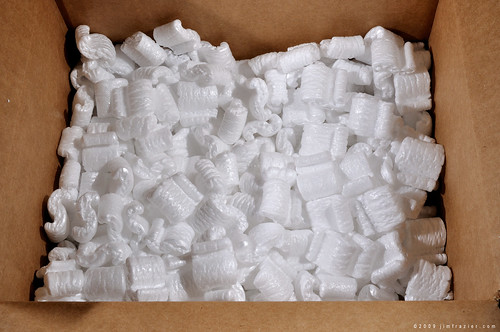 When you buy a can of beer, what are you really buying?
When you buy a can of beer, what are you really buying?When you purchase the can of beer, you're also buying the can, aren't you? Isn't the can sold to you with the product? Therefore, the can is an ingredient in the product called, a can of beer. Therefore, logically, shouldn't the brewery be able to buy the can for resale, just like the ingredients for the beer?
Containers that are sold with the product to the customer are generally not taxable.
If you go to a restaurant and they sell you pop (or soda, whatever) in a cup, they are able to buy that cup for resale. Because it is sold to you with the delicious beverage. But if you get your drink in a glass or a china cup, the container wasn't sold to you with the beverage and the seller should have paid tax when they bought it.
Returnable containers, like a keg of beer or a tank of propane, are generally taxable because they are not sold to the customer with the product. They are bought by the seller, empty of course, and used over and over again. The seller pays tax on those containers because they use them to transport their product to their customers.
But a container that is sold with the product to the customer, is not taxable when purchased by the seller.
By the way, this isn't just a manufacturing exemption. It generally applies to anyone who sells products. The grocery store doesn't pay tax on the bags they put your food into when you make a milk run.
That's the general rule, backed up with logic. But there are significant variations from state to state, mostly with the definition of container and customer.
Just about every state will say that the can itself is exempt. The container that actually touches the product and/or is received by the final consumer of the product, is almost always exempt when bought by the seller of the product.
How about this shipping container?

Usually the box would be exempt, if sold to the customer with the product inside the box. When I got this box, (which I carefully saved unopened so that I could photograph it and use it in this blog) the vendor didn't expect me to return it to them. I got the contents, plus a nice empty box. But, say the seller purchased boxes to ship materials internally from one division to another? In that case, the container would be taxable. It wasn't bought to sell with product to the customer.
But some states, as mentioned above, would not exempt the box, only the container touching the product. If the company shipping this box was in one of those states, they would have had to pay tax since the box doesn't touch the product. What the box contained was software (that I paid tax on...don't worry). In some states, only the software box containing the CD would be exempt, just like the can, because only the software box touched the product.
Let's say that box containing the software was sent to a dealer, who would then put the software on the shelves in their store. In a few states, the box would be taxable because it didn't get shipped to the final consumer.
And then, there's the beloved peanuts.

Some states have a problem with peanuts, bubble wrap, excelsior, etc. because it's not touching the product. The box might be exempt, because it's really containing something. But the peanuts are not a container, therefore they don't qualify for the exemption. In fact, they are being contained.
Shipping labels are often differentiated from marketing labels, or inventory control labels which are usually taxable.
And finally, there's skids (or pallets - whatever).

Pallets are barely containers. You could say that they are the bottom part of a container made up of the stretch-wrap on 5 sides and the pallet on the bottom. Might be tough, though.
Often, the state's rules don't use the term container, they use a variation on wrapping supplies or shipping materials. That's a good thing because then you can pretty much fold everything I've talked about into that definition, as long as the wrapping materials are sold with the product to the customer. But that also leaves room for the auditor to wiggle as well. I can see an auditor trying to make the case that the peanuts really aren't wrapping the product. I'm just sayin'
When I'm researching a state, I'll look for mention of specific items, like dunnage (a really obscure term for peanuts) and pallets. If a state exempts those things, I figure we're home free.
Hopefully it's obvious that people who sell services usually don't sell product. Therefore, there's no container exemption for them. Your CPA doesn't get to buy the envelopes, in which he sends out reports, tax free. He really hasn't sold a product. The report is really just the work product of his services. Except that, in a few states, dry cleaners bags are exempt when bought by the dry cleaner. Go figure.
Summary:
1. If you sell stuff, and you buy containers, you should see if you qualify for the container exemption. A lot of new businesses don't realize that this stuff is exempt to some degree.
2. You need to get as much information on the laws in the state where you receive and use those containers. What do they consider a container? And does the container have to get sold to the final consumer?
I've got a few more issues to talk about, but you've gotten enough to chew on for now. Stay tuned.
Sales Tax Guy
Please see the disclaimer
| Here's information on our upcoming seminars and webinars |
| And please don't forget to visit our advertisers! |
No comments:
Post a Comment